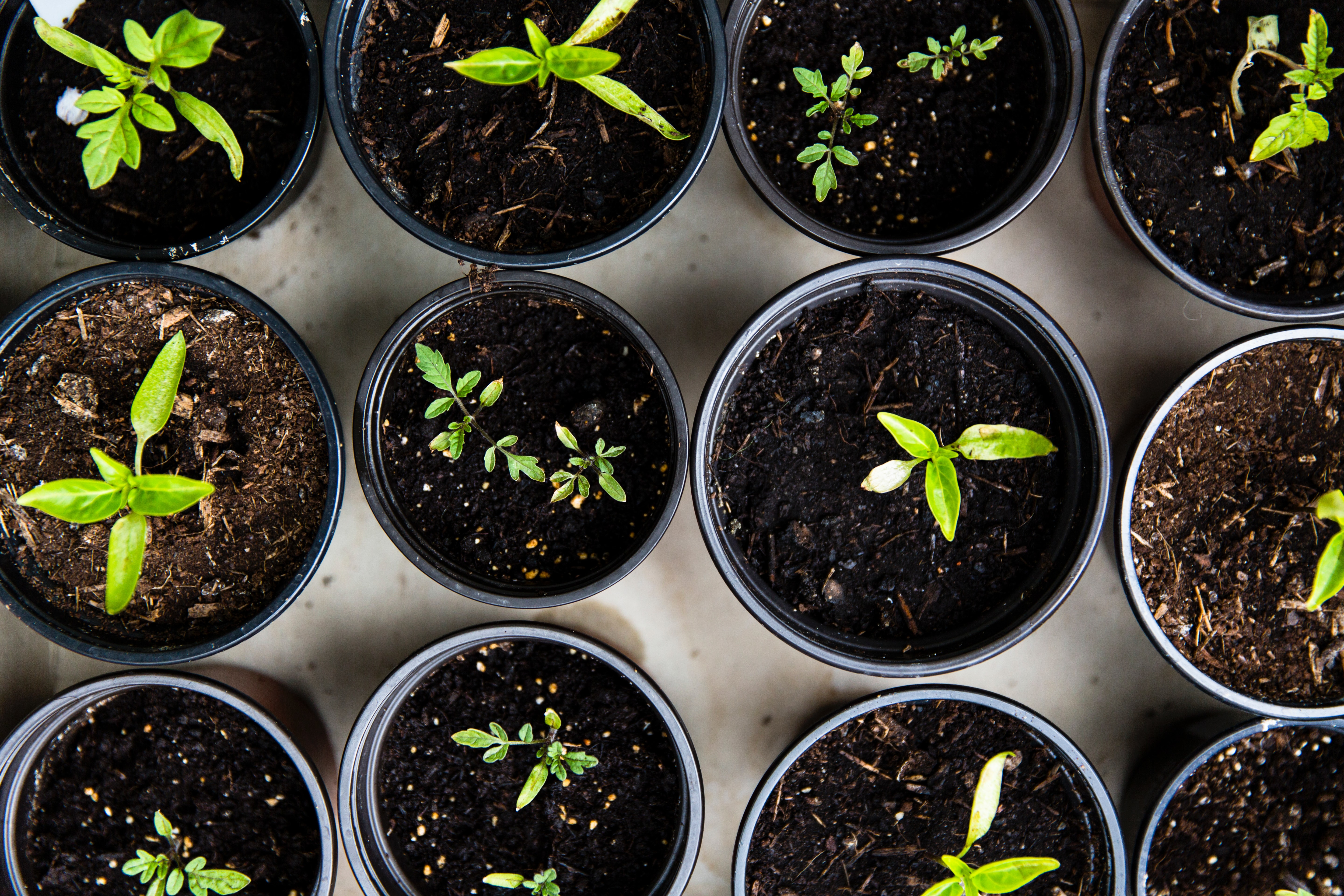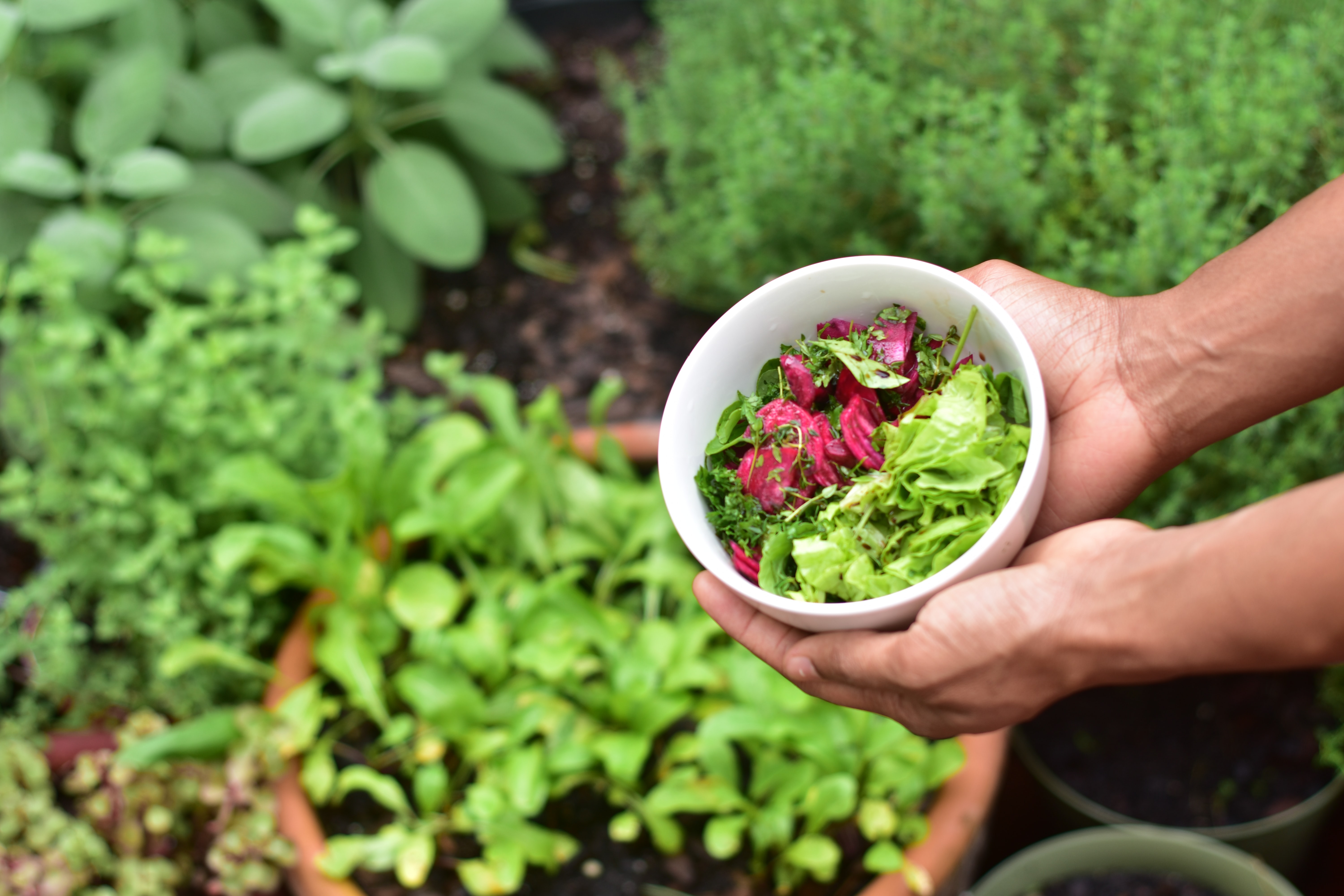Wondering how to grow your own food? If staying at home has you dreaming of tending a bountiful backyard garden, there are plenty of ways to get start growing your own fruits, vegetables, and herbs. This post is filled with all the tips you need for how to grow your own food in your backyard—even for beginners. Start reading, then get planting!
Benefits of Growing Your Own Food
There are many reasons why growing your own food is important—here are just a few.
- Get a nutritional boost: Fruits and veggies are good for you, of course, but when you grow your own food in your backyard, the produce is packed with extra minerals, vitamins, and antioxidants. Why? It’s the ultimate farm-to-table, and fresher than picking up a bunch of carrots that were grown several states away and trucked to your local grocery store.
- Keep money in the bank: Growing your own fruits and vegetables helps save money in the long-run. There are a few start-up costs with seeds, seedlings, and supplies, but your efforts can produce pounds of food to enjoy for many months throughout the year.
- Help the environment: A USDA report shares that “the food system accounts for a large share of fossil fuel consumption in the United States, and energy accounts for a substantial and highly variable share of food costs.” One of the culprits is the trucking industry, which transports produce from coast to coast—while emitting fossil fuels in the process. Keeping your food choices closer to home is one way to help improve the environment long-term.
How to Grow Your Own Organic Food
It’s easy to get excited at the prospect of gardening, then find yourself disappointed when a plant doesn’t sprout or pests eat your kale leaves. An important lesson for even seasoned gardeners is that growing food is always a learning process. No growing season is the same, and nothing ever goes 100 percent according to plan. Not to worry, though! Gardening is also completely worthwhile, especially if you stick with it year after year.
Beginner Gardener Tips

Time to start planning! You’re in the right spot for our best gardening tips for beginners, so keep these ideas in mind before you get started.
- Assess your space: Before ordering any supplies, survey your space. Are you sticking with the patio, or do you have a sunny patch in the yard to use?
- Start small: Along the lines of assessing your space, don’t be afraid to start small. Try a few containers or just one raised bed, even if your yard has space for more. A slow and steady approach will let you hone your skills without getting too overwhelmed.
- Find your zone: Every region has a different climate. Gardeners in Texas might be able to plant tomatoes in April, while Connecticut lawns need to wait until late June. Use this tool to find your zone on a map, and get to know your area’s unique soil considerations and recommended plant calendars.
- Research seeds: Serious gardeners get excited about seed magazines every winter—and you might too! It’s fun to look through every page and dream of what you can grow in the coming season. One tip: There are plenty of national seed resources, but don’t forget to look for state-specific or regional resources such as Southern Exposure Seed Exchange or Siskiyou Seeds in Oregon.
- Plant, water, and wait: Gardening takes time. If you read the back of your seed packets, you’ll see many plants require many weeks before you’ll have vegetables to harvest—take that into account when you plant, and work backwards to be sure you’re planting everything at the right time.
- Keep a record: Our last tip for beginner vegetable gardeners is to bust out a new notebook and start a garden journal. This will help you remember insights from year to year, what worked, and what you want to tweak.
Easiest Plants to Grow

What is the easiest plant to grow? That’s a common question among first-time gardeners. Here’s our list of some of the best vegetables to start with. (If you’re wondering about the easiest plants to grow indoors, consider microgreens and herbs.)
- Spinach
- Green beans
- Yellow squash
- Cucumbers
- Radishes
- Carrots
Home Herb Garden Tips
Here are some tips for planting an herb garden if you’re interested in having lots of ways to spruce up your dishes. First up, pick the right container. Any container will work for herbs—as long as it has good drainage. Picks like chives, mint, parsley, and marjoram work well in self-watering pots, while other herbs like basil, oregano, and thyme prefer to have dry soil between watering. Next, see the light. Most herbs require lots of sun—at least six hours worth—so take that into account when you choose a location.
Best Recipes for Fresh Produce
Whether you have a few small pots of herbs or a larger garden, there’s a recipe to highlight your bounty.
Vegan Ranch Dressing
Ranch dressing is a classic vehicle for fresh herbs. This vegan version whips up raw cashews with apple cider vinegar, fresh chives, and parsley.

Gluten-Free Focaccia Bread
Ready in just 30 minutes, you’ll love this gluten-free version of a popular Italian bread. Finish it with flaky salt and a medley of minced herbs.
Greens, Eggs, and Ham
This tasty frittata pulls out all the stops in the herb department. There’s plenty of cilantro and parsley, plus leeks, onion, and superfood powder to boost nutrition.
Chocolate Chip Zucchini Muffins
Zucchini is known for growing wild in the garden—put yours to good use in this paleo muffin recipe you’ll be making all summer long.
Olive Oil and Chocolate Rosemary Popsicles
Olive oil, cacao powder, rosemary, and coconut sugar make a perfectly sophisticated popsicle the whole family will love.
Tomato and Olive Oil Salad
Tomatoes, this is your time to shine! Several heirloom varieties dress up this plate drizzled with EVOO and flaky salt. Add a few pieces of torn basil and you’re good to go.
